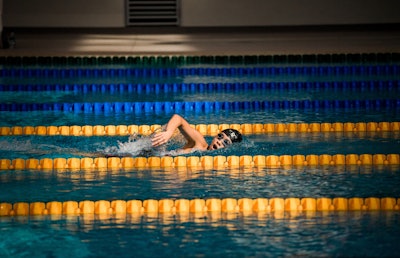
Ten members of the Roanoke College women’s swimming team spoke at a news conference last week to discuss their displeasure that a transgender swimmer wanted to compete for the Maroons.
As reported by The Roanoke Times, the swimmers called on USA Swimming and the NCAA to change rules that allow transgender athletes to compete.
“We deserve fairness too,” Lilly Mullens, one of three team captains, said at the press conference Thursday at the Hotel Roanoke. “These organizations have chosen to ignore and discriminate against women and girls.
“I am calling on the NCAA and lawmakers everywhere to stop the suffering and emotional turmoil that’s being placed on girls.”
According to a news release issued Thursday by Roanoke College, which competes at the Division III level, the swimmer in question was a former member of the Roanoke College men’s swimming team. The news release said that student “withdrew her request for participation on the women’s swim team” prior to a Tuesday meeting that the school’s board of trustees had scheduled to discuss the college’s policy on transgender athletes.
“While our own situation was at last resolved, that does not mean that our story, our voices or our experience should be silenced,” Kate Pearson, another captain, said.
“This is bigger than our swim team,” teammate Olivia Grabman said.
According to Mark Berman of the Times, Mullens, one of 17 members of the team, said her team had been told that a trans swimmer would be joining their team.
“As our school year began, we were left in the dark,” she said. “I sat in meeting after meeting next to my fellow captains, discussing every possible unknown, without getting concrete answers. Some of these meetings lasted over two hours, leaving me drained.
“Most nights I gave up on homework and went to bed, or at least I tried to. … The feelings of angst never disappeared.
“I questioned my purpose for swimming. … Why I would even try to swim if I was going to have to race against a [trans swimmer]?
“In private conversations with my teammates, I found out we were all experiencing the same anxiety, heartache and overall fear.
“Not a single administrator came to us to ask us how we felt or how we were holding up after the integrity of our sport was ripped away from us.
“The school was following … the NCAA policy, which tosses women like us aside.”
Mullens said the swimmers “lost the will to train to race a swimmer who has an advantage in the water that our bodies may never possess.”
Mullens’ mother, Katie Mullens, spoke at the news conference as 10 other parents stood behind her.
“This summer my daughter was getting ready to leave for college and as a captain of the team, she was making name plates for the girls. She made one for someone that used to be on the men’s team. I pointed at it and I said, ‘What’s this?’ My daughter replied to me, ‘I don’t know what’s going to happen. I can only hope that someone at the school or the NCAA recognizes the complete unfairness that this is going to bring,’” Katie Mullens said.
According to the Roanoke College news release cited in Berman's Times report, Roanoke College leaders learned at the start of the fall semester that a transgender student had requested permission to swim for the women’s swimming team. According to the news release, the student had competed for the men’s swimming team as a freshman, then took a year off from competition before returning to the sport for this season.
According to the news release, the college launched a process to help it make a decision about the trans swimmer, including an analysis of NCAA policy.
The NCAA policy calls for transgender athlete participation to be determined by the policy of each sport’s national governing body, including that governing body’s standards for testosterone levels. The NCAA also requires a trans female athlete to complete one year of testosterone suppression treatment before competing on a women’s team. The NCAA policy has a phase-in process that culminates with the 2024-25 school year.
Despite the trans swimmer’s change of heart about being on the Roanoke women’s swim team, the school’s board of trustees met last Tuesday to take a stance. The board adopted the NCAA’s policy, albeit without the phase-in process.
“This means Roanoke College will defer to the policy of the national governing body of each sport,” the college stated in the news release.
As reported by Berman, World Aquatics, the worldwide governing body for swimming, decided last year to restrict trans swimmers from competing against women in major international events such as the Olympics.
“World Aquatics policy protects the Olympians,” Bailey Gallagher, the third captain, said. “Where is the NCAA and USA Swimming? Why are they not protecting the rest of us?”
An open letter sent Thursday to The Roanoke Times called the Independent Women’s Forum, which was represented by two speakers at the press conference, “a national conservative organization with a documented history of anti-transgender activism.” The letter was signed by the Virginia Harm Reduction Coalition, the Southwest Virginia LGBTQ+ History Project, Roanoke Vice Mayor Joe Cobb and Roanoke City Councilman Peter Volosin, among others, Berman reported.
Virginia Harm Reduction Coalition executive director Danny Clawson, a Roanoke resident who identifies as trans, observed the news conference. Afterward, Clawson stated, “There’s a lot of things that we could be doing right now to support women in sports. However, this just serves to … bully and marginalize vulnerable [trans] individuals."





































